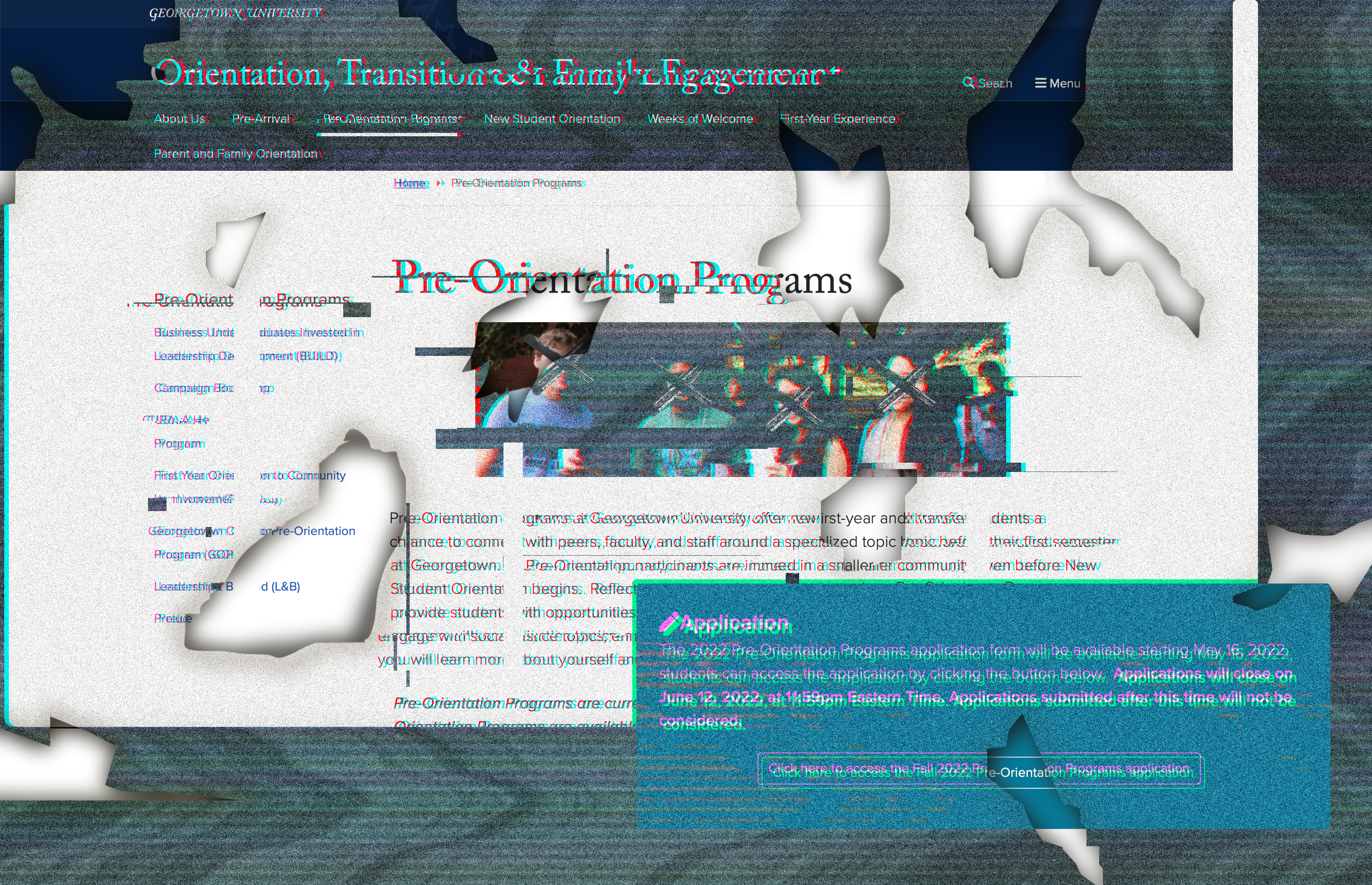While New Student Orientation (NSO) kicked off last week, some Hoyas had already settled into their dorms through pre-orientation programs (pre-os). Leadership & Beyond (L&B), First-Year Orientation to Community Involvement (FOCI), and Business Undergraduates Invested in Leadership Development (BUILD) are just a few of the programs introducing new students to life on the Hilltop with some key tools they need to succeed. Yet, the students who would benefit from these programs most—marginalized students—often can’t access them.
Pre-os are themed one-week co-curricular programs centered around a common interest, occurring right before New Student Orientation. While pre-os provide participants with social integration and important opportunities for growth before the year even begins, the limited number of spots combined with an application that doesn’t explicitly prioritize marginalized students perpetuate inequities already present at Georgetown.
This year, Georgetown offered six week-long pre-os with unique programming for new students, with YLEAD on hiatus. Programs like BUILD provided students an introduction to careers in business and finance, and L&B helped students build and apply leadership skills at Georgetown. Each of these pre-os also advertised a wide range of professional development offerings, from exclusive site visits and alumni meetings to critical engagement and exposure to social justice activists and community work.
Community service, leadership, and activism on campus aren’t often thoroughly addressed during NSO, so it’s critical that the information covered in pre-os is more accessible to new students who may not have had access to education about those opportunities in the first place. Those who miss out on these programs are put at an immediate disadvantage in terms of opportunities for external professional connections and mentorship from upperclassmen.
Each pre-o attendee also gains a chance to bond with a close-knit group of other new Hoyas before meeting the rest of their peers, which is especially pivotal given the struggle of finding friends when new students arrive to campus. Pre-os play a crucial role for attendees’ social adjustment, with a more tailored view of Georgetown untold at NSO, safer spaces for students to do formation work, specifically trained mentors available to students’ first semesters at Georgetown, and more.
Incoming students can apply to and rank their top three pre-orientation programs sometime between mid-May and mid-June, and are notified of a decision in July. Beyond this, there is no further transparency around the pre-o admissions process. Acceptance rates are not published, and there is little clarity as to what programs are seeking in applicants.
As a predominantly white institution with a student body where over 50 percent of students’ families have an income in the top five percent of American households, Georgetown needs to increase access to these important resources for students of marginalized identities. While BUILD highly encourages students of color and first-generation students to apply, each of the other pre-os do not indicate priority for admitting underrepresented students. Only the one-day Prelude offers open admission to all students, with programming that pales in comparison to week-long pre-os.
Given the significant benefits that marginalized students would gain from participating in pre-os, they should fill a large majority, if not all, of the space in these programs. However, a pre-o application not built for marginalized students benefits socioeconomically privileged applicants.
For one, class differences have impacts on how accessible pre-os are. In terms of pure finances, the Georgetown Outdoor Pre-Orientation Program (GOPOP) costs at least $400. The high price of the program, the lack of any pre-o financial aid, and the fact that GOPOP may take students away from paid summer work could prevent low-income students from applying.
Even though the majority of pre-os are free, marginalized students are still at a disadvantage in the application process because they often have to navigate the new and bureaucratically complex world of applications without a built-in support system. More privileged students often have access to more support on any type of application, as well as past opportunities that make them more competitive applicants.
Marginalized students having reduced access to pre-os follows the trend of other inequities they will face at Georgetown. These same students may face future applications to clubs or special programs that don’t heavily factor in their identities and circumstances and may continue to struggle to find communities they trust.
Restructuring pre-os to be more accessible would further equity goals at Georgetown. For instance, one potential model to follow is the Community Scholars Program (CSP). Marginalized students often struggle when entering college due to the lack of generational knowledge and difficulties finding spaces and communities they can trust. By providing a five-week headstart for first-generation, low-income students of color, CSP serves as an example of a program—while not a pre-o—that evens the playing field by making sure marginalized students get support.
Georgetown should consider centering equity within the pre-o admissions process, with the prioritization of marginalized students for pre-o spots. An updated pre-o application should include a standardized question giving students the opportunity to highlight their unique identities and circumstances that could make their transition to Georgetown difficult, necessitating access to the resources of pre-os. This would ensure that all program coordinators hear important perspectives from marginalized students. Finally, modeling off of UChicago’s summer programming, Georgetown could create specific pre-os for international students who currently do not have a chance to build trust within a community before NSO.
Recruitment is also a significant area where pre-os fall short. Georgetown does not actively promote pre-os in welcome letters, nor does it conduct specific targeted outreach for its pre-o programs. More forms of outreach would bring in more diverse students. Georgetown could expand its Diversity and Access program within the Office of Undergraduate Admissions or have student Ambassadors in the Georgetown Admissions Ambassador Program focus on targeted pre-o outreach: sending emails, mailers, and making phone calls to committed Georgetown students who hold underrepresented identities.
We must restructure pre-os to focus on prioritizing the recruitment and admission of students of underrepresented communities at Georgetown—including but not limited to first-generation, low-income, Black, Latino, AAPI, Indigenous, and LGBTQ+ students. Marginalized students should have access to mentorship, service opportunities, and community without the barrier of an application process not built for them. Georgetown must provide more resources to help underprivileged and underrepresented students succeed at Georgetown—and that starts with making pre-os more equitable.






This is inaccurate. Did you reach out to a GOPOP representative for comment? Financial aid for GOPOP was offered and has been in the past based on participant request.